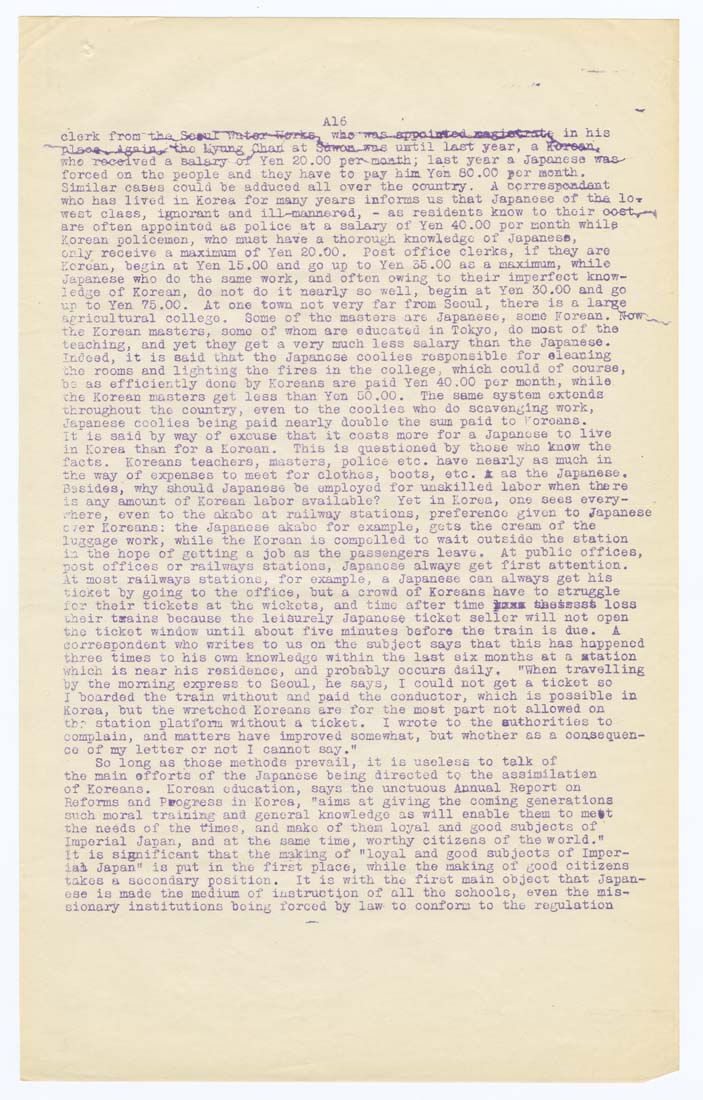A16
clerk from''1ihii..3e#iir''T»T^t«p-5i«rj*&j^^^^
'"T.ljy-a-^ .*a° iTjc**'^" Myun^jlhari. at S'swoa.-was
who received a salary oT Yen 20.00 per^month; last year a Japanese was-'
forced on tho people and they have to pay him Yen 80.00 per mon-th.
Similar cases could be adduced all over the country. A c<)rrespoadant
who has lived in Korea for many years informs us that Japanese of 'tha lo-r
west class, ignorant and ilX-mann&rod, - as residents know to their oosty—*
are often appointed as police at a salary of Yen 40.00 por month while
Korean policemen, who must ha've a thorough knowledge of Japanese,
only receive a maximum of Yen 20.00. Post office clerks, if they are
Eore'an, begin at Yen 15.00 and go up to Yen 35.00 as a maximum, while
Japanese who do the same work, and often owing to their imperfect know¬
ledge of Korean, do not do it nearly so well, begin at Yen 30.00 and go
un to Yen 75.00. At one town not very far from Seoul, there is a lar^
agricultural college. Some of tho masters are Japanese, some Korean, ffow^,^
the Korean masters, some of whom are educated in Tokyo, do most of the
teaching, and yet they get a very much less salary than the Japanese-
Indeed, it is said that the Japanese coolies responsible for eleaning
the rooms and lighting the fires in the college, which could of course,
b3 as efficiently done by Koreans are paid Yen 40.00 per month, while
Che Korean masters get leas than Yen 50.00. The seme system extends
throughout the country, even to the coolies who do scavenging work,
Japanese coolies being paid nearly double the sum paid to i'oroans.
It is said by way of excuse that it costs more for a Japanoae to live
in Korea than for a Korean. This is questioned by those who know the
facts. Koreans teachers, masters, police etc. have nearly aa much in
the way of expenses to meet for clothes, boots, etc. A as the Japanese,
Besides, why should Japanese be employed for unskilled labor when there
is any amount of Korean labor available? Yet in Korea, one sees every-
>"here, even to the akabo at railway stations, preference given to Japanese
c/er Koreans: the Japanese akabo for example, gets the cream of the
luggage work, while the Korean ia compelled to wait outside the station
in the hope of getting a job as the passengers leave. At public offices,
post offices or railways stations, Japanese always get first attention.
At most railways stations, for example, a Japanese can always get his
ticket by going to the office, but a crowd of Koreans have to struggle
fcr their tickets at the wickets, and time after time ^ixam febssBsst loss
cheir tsains because the leisurely Japanese ticket seller will not open
tho ticket window until about five minutes before the train is due. A
correspondent ¥/ho writes to us on the subject says that this has happened
three times to his own knowledge within the last six months at a station
which is near hia residence, and probably occurs daily, ""Hhen travelling
by the morning express to Seoul, he says, I could not get a ticket so
I boarded tho train without and paid the conductor, which is possible in
Korea, but the wretched Koreans are for the most part not allowed on
thr station platform without a ticket, I wrote to the authorities to
complain, and matters have improved somewhat, but whether as a consequen¬
ce of my letter or not I cannot say."
So long as those methods prevail, it is useless to talk of
tho main efforts of the Japanese being directed to the assimilatien
of Koreans. Korean education, says the unctuous Annual Beport on
Reforms and Ppogress in Korea, "aims at giving the coming generations
such moral training and general knowledge as will enable them to meit
the needs of the 'tfimes, and make of them loyal and good subjects of '
Imperial Jatian, and at the same time, worthy citizens of the world."
It is significant that the making of "loyal and good subjects of Imper-
iai Japan" is put in the firs-t place, while the making of good citizens
takes a secondary position. It is with the first main object that Japan¬
ese is made the medium of instruction of all the schools, even the mis¬
sionary institutions being forced by law to conform to the regulation
|








